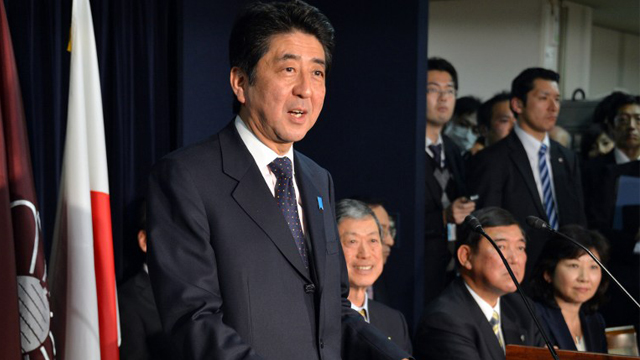SUMMARY
This is AI generated summarization, which may have errors. For context, always refer to the full article.

TOKYO, Japan (UPDATED) – Japan pledged $20 billion in aid and loans to Southeast Asia on Saturday, December 14, the latest step in its bid to woo global public opinion in a territorial dispute with China.
Prime Minister Shinzo Abe offered the cash over five years for members of the Association of Southeast Asian Nations (ASEAN) at a celebratory summit to mark 40 years of ties with the bloc.
The announcement crowns a year of courting by Abe, who has visited all 10 countries in the grouping at least once since he came to power last year, always with one eye on wresting back influence in the region from China.
“Together with ASEAN, I want to build the future of Asia where laws, rather than power, rule, and people who worked hard will be rewarded – which would lead to a prosperous society with mutual respect.”
That apparently was an oblique reference to his country’s fractious spat over the sovereignty of a small chain of islands in the East China Sea, where Japan is keen to garner support for its view that Beijing’s behaviour is aggressive and coercive.
The case has taken on a greater urgency since China’s declaration last month of an Air Defence Identification Zone (ADIZ) over the East China Sea – including the contested archipelago.
Beijing said all aircraft entering the zone have to submit flight plans and obey orders issued by Chinese authorities, in an announcement that was widely criticised as inflammatory.
That came after more than 12 months of confrontations between Japanese and Chinese coastguards in the seas near the islands, as well as forays by military and paramilitary planes, and shows of strength by naval vessels.
Some fear the ADIZ in the East China Sea is a forerunner to a similar zone in the South China Sea, which Beijing claims almost entirely.
Abe said Saturday that the 2 trillion yen ($20 billion) in loans and grants is part of a bigger relationship.
“In this summit, I would like to discuss relations between Japan and ASEAN in the context of not only our bilateral relations, but also in the context of the international community.
“I hope we will adopt a mid- to long-term vision that would define the way Japan and ASEAN cooperate in the future.”
On Friday, Tokyo boosted currency swap deals with Indonesia and the Philippines, as well as renewing one with Singapore.
Philippines President Benigno Aquino III is in Japan for the Association of Southeast Asian Nations (ASEAN)-Japan Commemorative Summit. Japan and the Philippines will discuss a possible defense treaty in the wake of growing tension in the West Philippines Sea.
The deals give governments room to manoeuvre in times of economic stress because they can be tapped as a supply of liquid assets – usually US dollars – if normal currency markets seize up.
Japanese diplomats have pushed hard for the joint communique due at the end of the meeting to be a relatively forceful statement on the importance of freedom of navigation on the seas and in the air.
Although unlikely to make any explicit reference to China, any such statement could be viewed as an implicit criticism.
Observers say Japan will find a reasonably willing audience among the four members of ASEAN who have their own territorial disputes with China – the Philippines, Vietnam, Malaysia and Brunei.
But all 10 members of the bloc, which also includes Cambodia, Indonesia, Laos, Myanmar, Singapore and Thailand, have to tread a fine line to avoid irritating China, whose vast economy is vital to the region.
That point was underlined by Indonesian President Susilo Bambang Yudhoyono ahead of his meeting with Abe on Friday, when he said disagreements in Northeast Asia are “pertinent” for the rest of the continent.
“In particular, it must be said that good relations between China and Japan are critical to the future of our region,” he said.
Abe’s charm offensive has also been aimed at drumming up business for Japan’s infrastructure-makers, with the prime minister keen to boost exports and help give the domestic economy a kick after years of lassitude. –Rappler.com
Add a comment
How does this make you feel?
There are no comments yet. Add your comment to start the conversation.